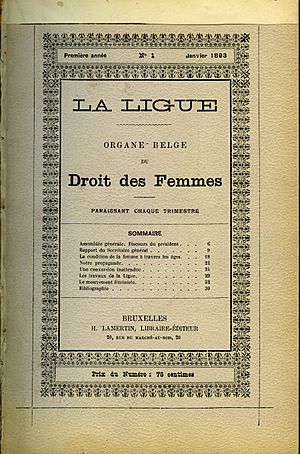Belgian League for the Rights of Women facts for kids
The Belgian League for the Rights of Women was an important group in Belgium that worked for women's equality. It was started in 1892 by Marie Popelin, a woman who had studied law, and her lawyer, Louis Frank. They created the League because Marie Popelin was not allowed to work as a lawyer, even though she had finished her studies.
The League was inspired by a similar group in France. When it first began, about 300 people joined. At first, the League focused on making sure women had equal rights in many areas of life. Later, in 1912, they made getting women the right to vote their main goal.
Contents
What Was the Belgian League for Women's Rights?
The Belgian League for the Rights of Women was a group that aimed to improve women's lives in Belgium. They believed women should have the same opportunities and rights as men. This included rights in education, work, and law.
How It Started
In 1892, Marie Popelin finished law school. However, she was told she could not become a lawyer because she was a woman. This unfair decision led her and Louis Frank to create the League. They wanted to fight for women's rights and make sure such unfair rules were changed.
Around the same time, May Wright Sewall visited Europe. She was promoting the International Council of Women (ICW), a big international group for women. She invited members of the Belgian League to a large meeting in Chicago in 1893. Later, in 1905, the League helped create the Conseil national des femmes belges. This group became the Belgian part of the ICW.
Working for Change
From the very beginning, the League published its own newspaper. It was also called Ligue belge du droit des femmes. This newspaper shared news about women's rights in Belgium and other countries. It helped people stay informed about the growing movement for women's equality. The newspaper was published until the First World War started.
Helping Shop Assistants
In the early 1900s, the League achieved some important successes. They helped shop assistants get the right to sit down when there were no customers. They also worked to limit how late shop assistants had to work at night. The League also helped protect these workers from harmful situations.
Fighting for the Right to Vote
For a while, the League focused on many different equal rights issues. However, getting women the right to vote became a top priority later on. At a big meeting in Brussels in April 1912, the League decided that voting rights for women was their most important goal. The next year, Jane Brigode, who was the League's secretary, asked all women's groups to work together to achieve women's suffrage.
Challenges and Changes
The League faced some challenges in the late 1890s. Isabelle Gatti de Gamond, another important member, wanted the League to support socialist politicians. However, Marie Popelin wanted the League to stay out of politics. Because of these differences, Isabelle Gatti and her friends left the League in 1899. She then joined the Belgian Labour Party.
After the First World War
After the First World War, people tried to restart the League's activities. They held a few meetings in the 1920s. However, the League did not regain its earlier strength. By the 1930s, many Belgian women became more interested in working for peace.


